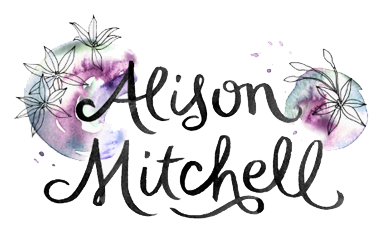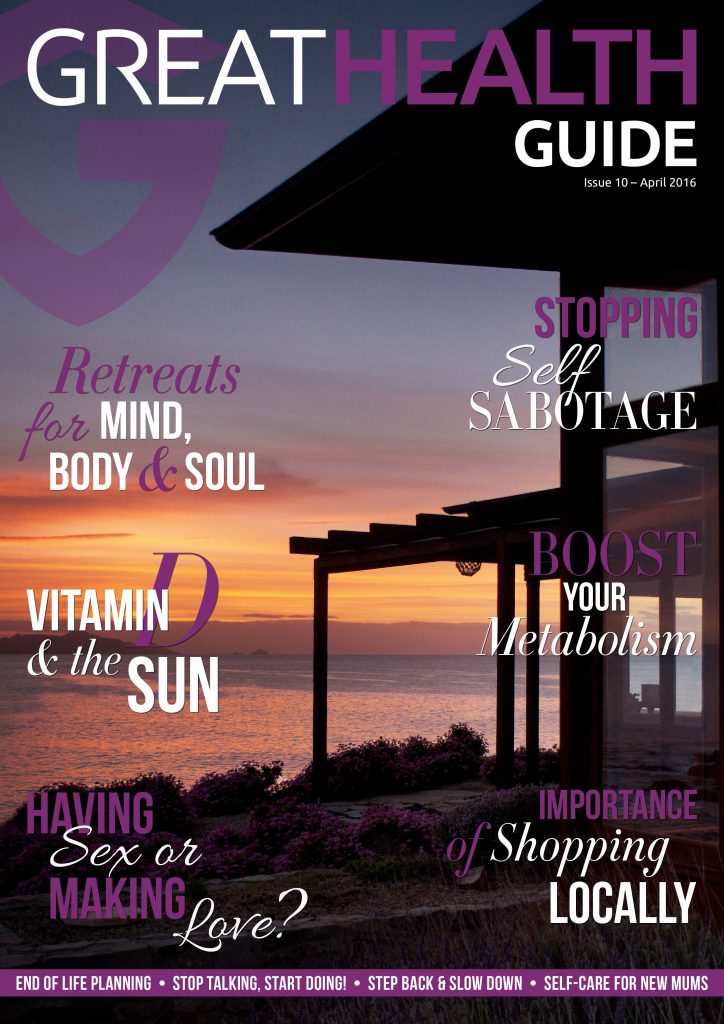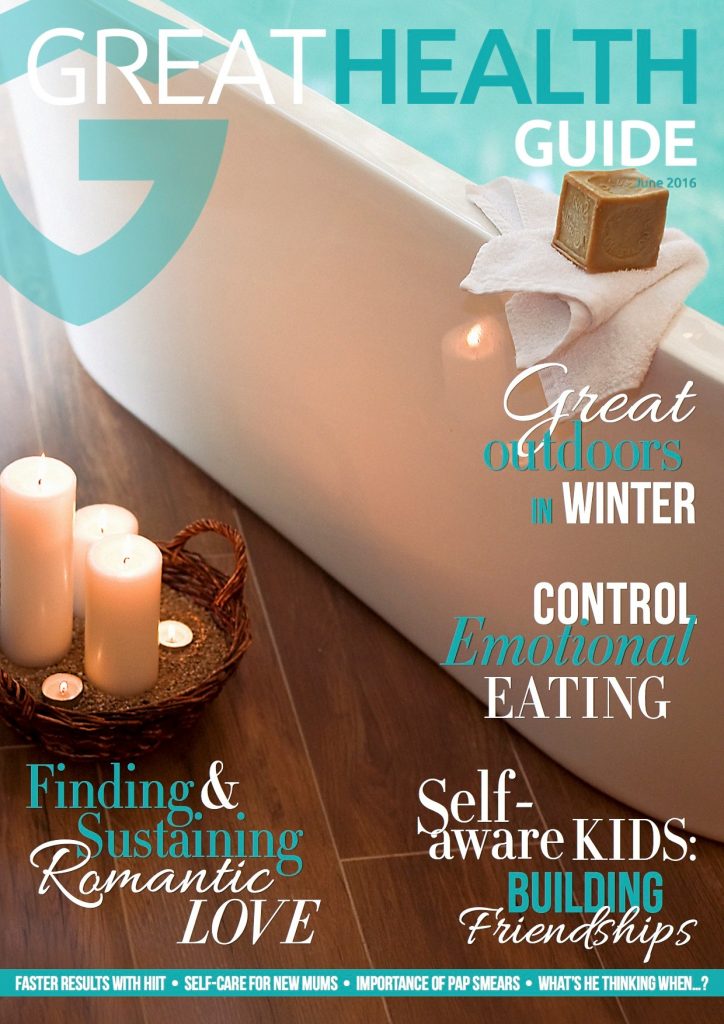Self Care for New Mothers
This article was published in Great Health Guide magazine in April (Part 1) and June (Part 2) 2016
You’ve just had a baby..
Firstly, congratulations on achieving the amazing feat of building a tiny human within yourself. You’ve just made it through 9 months of pregnancy which for some women can be a tough slog dealing with various degrees of unpleasantness such as morning sickness, fatigue, fluid retention and back pain. And then you gave birth – whether it was a vaginal birth or a c-section, you were incredibly brave and strong.
During all this time, care and attention has been directed at you. You quite likely tried very hard to eat well and you took your vitamins regularly with the intention of growing a healthy baby. Perhaps if you were lucky you were pampered with foot rubs, back massages and relaxing baths to soothe your aches and pains. You may have even attended pregnancy yoga or Pilates classes, aquarobics, or walked more regularly than you did before you were pregnant.
But now your baby has arrived and suddenly there’s not as much time to look after yourself, but it’s just as important to look after yourself now as it was while you were pregnant. In this two part article I will share with you some ways which you can look after yourself without sacrificing too much of your time.
Things that new mums can do to take care of themselves
Take an hour just for yourself each week.
Recent research has found that new mothers who take at least one hour of time for themselves each week significantly reduce their chances of experiencing postnatal depression. How you spend this time is up to you, but if you need ideas, perhaps you could consider getting a massage, taking a relaxing bath, going for a long walk, attending a yoga class, going shopping, seeing a movie or sitting in the park reading a book.
Don’t stop talking your vitamins.
You need to be getting an abundance of nutrients just as much now as you did while you’re pregnant, this is especially so if you are breastfeeding. You lose a lot of minerals, including zinc and iron, while you are giving birth so it’s important to replace them.
Zinc has a lot of roles in the body but most notably for new mums it helps to keep your hormones balanced. Good levels of zinc also help wound healing and reduce nipple damage from breastfeeding.
Iron levels can drop if you lose a lot of blood during birth, and this mineral is important for energy and immune health.
Magnesium and B vitamins are also very important for new mothers as they help with energy, mood and relaxation.
In the last two trimesters of pregnancy and during breastfeeding you give Baby a lot of calcium to help build their bones, and if you’re not eating enough this can be broken down from your bones so it is important you’re getting enough. Calcium, along with magnesium is also important for muscle and nerve health and low levels can contribute towards tension.
While it’s possible to get plenty of nutrients from food sources alone, new Mums often struggle to find the time to eat well and so it is recommended to take a supplement as an insurance against deficiency. Talk to your healthcare practitioner about which supplements may be best for you.
| Nutrients and their food sources. | ||
| B Vitamins | Wholegrains; nuts and seeds; legumes; nutritional yeast; dairy; red meat and organ meats; eggs; green leafy vegetables. | |
| Calcium | Milk and milk products; canned fish with bones (salmon, sardines); fortified tofu and fortified soy milk; greens; sesame; legumes | |
| Iron | Organ meats; red meats; fish; poultry; shellfish; egg yolks; legumes; dried fruits; dark, leafy greens; iron-enriched breads and cereals; and fortified cereals | |
| Magnesium | Nuts and seeds; legumes; leafy, green vegetables; seafood; chocolate. | |
| Zinc | Meats, fish, poultry, vegetables | |
Breathe to be calm
Meditation, mental stillness, or mindfulness comes in many forms, but my favourite way of calming the mind is to simply focus on the breath. Sit in a quiet spot, breathe through your nose slowly and by concentrating on the action of breathing, other thoughts are swept away.
This may be something you can do during a nap time, or if you have someone who can watch Baby for a little while. I would suggest to take 5-10 minutes a day to do this by yourself as well as while you are putting Baby down to sleep. If you are feeling anxious or your mind is occupied with other tasks that you need to do, it will drag the process out as Baby will pick up on your state of mind.
Part 2
Being a new mother can be a wonderful experience, but if you are feeling poorly then it can be difficult to enjoy this time to the fullest. Taking care of your mind and body will allow you to cope with the stresses placed on you during this time (such as sleep deprivation) and will also have a flow on effect to improve the health of Baby.
In part 1 of this article I shared some key ways to care for yourself after having a baby including taking time for yourself, practicing mental stillness and ensuring you were obtaining adequate nutrition. Read on below for some more ways to care for yourself after having a baby.
Meal prep.
It’s not uncommon for new mums to sacrifice their good eating habits due to lack of time to cook, often resorting to take away food or quickly thrown together meals that don’t contain the variety of nutrients that a new mother needs.
If possible start making and freezing some healthy meals while you are pregnant, but if you haven’t been able to do this you can start meal prepping now.
In addition to freezing meals in advice, you can also try the following ways of building up your meal reserves.
- Make extra servings for dinner and set it aside for lunch the next day.
- Take an hour or two a week to make a big meal that you can separate into portions and freeze.
- Set your breakfast up ready to go the night before.
- Organise to get your groceries delivered either by ordering from companies which ship variety boxes or online supermarket ordering. Ideally start this before you’ve given birth so that you don’t have to stress about it afterwards.
- Ask some friends or family members to bring you some meals.
When deciding what to cook, I have found it best to have a meal which can be eaten with one hand and wasn’t too hot, I often held my baby on my lap while eating – a newborns schedule is rather unpredictable.
Move and stretch.
5-10 minutes every day, perhaps while you’re in the shower or before you go to bed, stretch your neck, your arms, your back and your sides. You can find plenty of short yoga routines that you could follow on YouTube. Try to make this a daily ritual.
Lifting, holding and feeding baby can take its toll on your body, and muscle tension can lead to poor mood, poor sleep and reduced milk supply. If possible get a monthly massage to aid in the reduction of muscle tension as well.
After the first 6 weeks aim to go for a walk (take Baby with you!) every 1-2 days for about 30 minutes. It’s a great way to get some fresh air and a change of scenery, but walking is also an excellent way to keep fit without placing strain on damaged and tired muscles from pregnancy, childbirth or C-section.
Talk to other grown ups
It’s so easy to lock yourself away with Baby and forego spending time with other friends and family, and when the excitement of new baby wears away visitors start to dwindle, so it comes to you to reach out for interaction with your grown up friends. I consider this to be an important for a few reasons: it helps you to maintain relationships which so easily can dissolve during this period of life, it keeps you mentally active and it gives you an opportunity to talk about how you are feeling and coping.
In addition to keeping in contact with your existing friends, I recommend making connections with other mothers by joining local mothers groups or perhaps attend ABA meetings.
Follow your intuition.
‘Back in the day’ we used to have a network, or village, of people surrounding us that provided guidance when we had doubts about child-rearing. But now we are not surrounded by this small intimate group of trusted people, instead we have the Internet.
This can be both a blessing and a curse as while we can usually find an answer within minutes to questions such as “Why does my newborn squeak/snort/poo green” etc., it’s easy to come across comments or articles that make you feel inadequate or judged.
There are likely to be plenty of friends, family or acquaintances that will tell you what worked for them as well, but remember that this may not always be the best thing for you.
It’s great to get information but there is rarely one right way to do things so trust your own intuition and do what’s right for you and your baby.
Trust your own intuition and do what’s right for you and your baby.
Taking care of yourself as a new mother is just as important as taking care of Baby – you need to be well enough to care for Baby after all. Look after your body by eating well and keeping active, and look after your mind by practicing mental stillness and maintaining contact with friends and family.
[fb_button]













